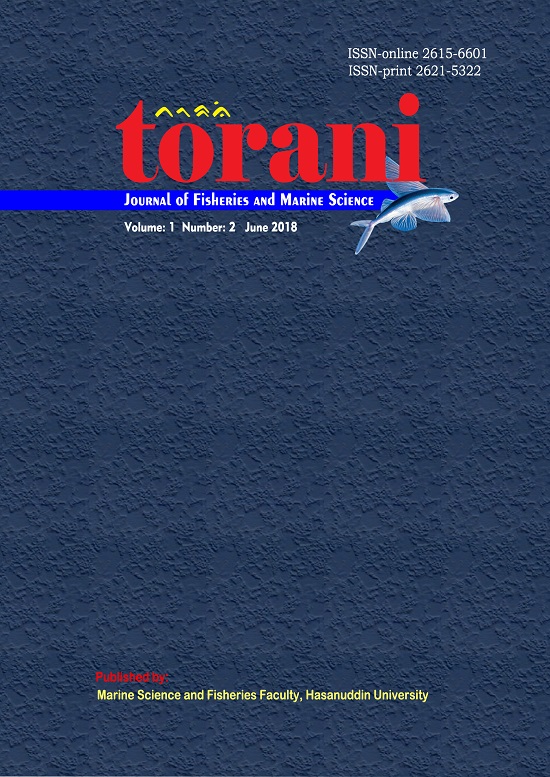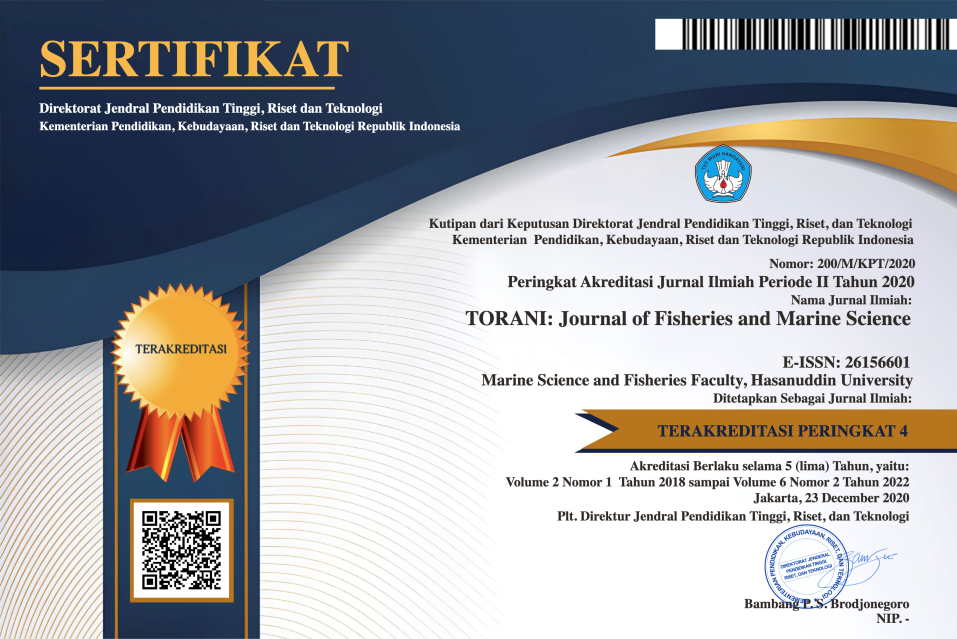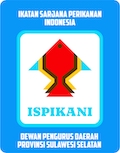Macrozoobenthic Community in Different Mangrove Condition: Relation with Chemical-Physical Sediment Characteristics
DOI:
https://doi.org/10.35911/torani.v1i2.4441Abstract
The existence of mangrove in coast areas have both ecologic and physical important functions. Mangrove is a high productive ecosystem. Litters from fallen leaves and twigs are organic sources for macrozoobenthic life. The aim of this research was to determine the response of macrozoobenthics on total organic matter content and other chemical-physico characters of sediments due to differences in mangrove conditions. This research was conducted from May to September 2016 in Sub-district of Ampallas, Distric of Mamuju, Province of West Sulawesi, Indonesia. Sediments in 20 cm2 transects were collected using small shovel to obtain the macrozoobenthic samples. The sediments contained macrozoobenthics were sieved using a 1 mm mesh size sieve net. Four sampling sites were chosen, each to represent areas with no mangroves, low, medium, and high densities. The total of organic matter samples were collected using 2 inch diameter of PVC pipe cores, which were analyzed further using Loss by Ignition method. Besides total of organic matter, several parameters (i.e. redox potential, sediment pH, salinity, temperature, and dissolved oxygen) were measured. The results showed that gastropods dominated the existed macrozoobenthics. Gastropods and oligochaete lived in greater amounts in high mangrove density site with higher organic matter content and fine substrate.
Keywords: mangroves, macrozoobenthics, organic matter, Distric of Mamuju
References
Dharmawan IWE, Pramudji. 2014. Panduan Monitoring Status Ekosistem Mangrove. Coral Reef Rehabilitation and Management Program CTI. Jakarta.
Dharmawan IWE, Zamani NP, Madduppa HH. 2016. Laju dekomposisi serasah daun di ekosistem bakau Pulau Kelong Kabupaten Bintan. Oseanologi dan Limnologi Indonesia 1 (1): 1-10.
Heiri O, Lotter AF, Lemcke G. 2001. Loss on ignition as a method for estimating organic and carbonate content in sediment: reproducibility and comparability of result. Journal of Paleolimnology. 25: 101-110.
Isyrini R, Werorilangi S, Mashoreng S, Faizal A, Tahir A, Rachim R. 2017. Karakterisasi kondisi kimia-fisika lingkungan pada tingkatan densitas mangrove yang berbeda di Ampallas, Kabupaten Mamuju, Sulawesi Barat. Spermonde. 2 (3): 43-49.
Leung JYS, Cheung NKM. 2017. The structure and organisation of integral marine benthic communities in relation to sieve mesh size. Marine Pollution Bulletin. 116 (1-2): 454-461.
Amin B, Nurrachmi I, Marwan. 2012. Kandungan Bahan Organik Sedimen Dan Kelimpahan Makrozoobentos Sebagai Indikator Pencemaran Perairan Pantai Tanjung Uban Kepulauan Riau. http://repository.unri.ac.id:80/handle/123456789/1466.
Nordhaus I, Salewski T, Jennerjahn TC. 2012. Food preferences of mangrove crabs related to leaf nitrogen compounds in the Sagara Anakan Lagoon, Java, Indonesia. J. Sea Res. 65: 414-426.
Odum EP. 1993. Dasar-dasar Ekologi. Gajah Mada University Press. Jogjakarta.
Qiu GY, Zhou F, Shi X. 2014. Effects of mangrove forest on the biodiversity of macrobenthos under the condition of severe water pollution. Ecohydrology. 8 (7): 1262-1271.
Sanusi HS, Kaswadji RF, Nurjaya IW, Rafni R. 2005. Kajian kapasitas asimilasi beban pencemaran organik dan anorganik di Perairan Teluk Jobokuto Kabupaten Jepara Jawa Tengah. Jurnal Ilmu-Ilmu Perairan dan Perikanan Indonesia. 12 (1): 9-16.
Somerfield PJ, Dashfield SL, Warwick RM. 2018. The structure and organisation of integral marine benthic communities in relation to sieve mesh size. J. Exp. Mar. Biol. Ecol. 502: 164-173.
Tomassetti P, Gennaro P, Lattanzi L, Mercatali I, Persia E, Vani D, Porrello S. 2016. Benthic community response to sediment organic enrichment by Mediterranean fish farms: Case studies. Aquaculture. 450: 262-272.















